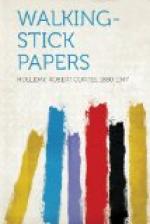Dipping the dales, riding the swells, the automobiles come, like gigantic bugs coming after the wicked. With a sucking rush of wind and dust and an odour of gasoline they are past. Stray pieces of paper at the roadside arise and fly after them, then, further on, sink impotent, exhausted.
“I have found that no exertion of the legs can bring two minds much nearer to one another!” One who goes much a-journeying cannot understand how Thoreau got it so completely turned around. But after the first effervescence of going a journey (of speech a time of times) has passed, and when, next, the fine novelty of open observation has begun to pale, there are still copious resources left; one retires on the way, metaphorically speaking, into one’s closet for meditation, for miles of silent thought—when one’s stride is mechanical, and is like an absent-minded drumming with the fingers; but that it is better, for it pumps the blood for freer thought than in lethargic sitting.
In this rhythmic moving one thinks as to a tune. To sit thus absolutely silent, absent in thought completely, even with that friend one wears in one’s heart’s core, will at length become dull for one or other; sitting thus one is tempted, too, to speech. Walking, it is not so. One may talk or one may not. If both wish to think, both feel as if something sociable is being done in just walking together. If one does not care to go wool-gathering, the other does not leave him without entertainment; walking alone is entertainment. It is assumed, of course, that one goes a journey in silence as in speech with the companion with whom one has been best seasoned. Silently walking, the movement of the mind keeps step in thought exactly with the movement of the man, so that the pace is a thermometer of the temperature at that moment of one’s brain.
One who has written on going a journey as well perhaps as the world will ever see it done owned that he never had had a watch. Further, he intimated that the possession of one was an indication of poverty of mental resource. It was his own wont, he said, to pass hours, whole days, unconscious of the night of time. He described his father as taking out his watch to look at whenever he could think of nothing else to do. His father, our author says, was no metaphysician. It must be confessed that one now writing of journeys, sometimes, somewhat unmetaphysician-like, conscious of the flight of time, has communication with a watch; and, finding the day well advanced, decides, speaking very figuratively, to lay the cloth, beneath some twisted, low, gnarled apple tree.
“At the next shadow,” he suggests.
“Let’s wait until we get to the top of this hill, first.”
“Here we are.”
Sweet rest! when one throws one’s members down upon the turf and there lets them lie, as if they were so many detached packages dropped. Then one feels the exquisite nerve luxury of having legs: while one rests them. One’s back could lie thus prone forever. One feels, sucking all the rich pleasure of it, that one couldn’t move one’s arms, lift one’s hand, if one had to. What are the world’s rewards if this is not one!




